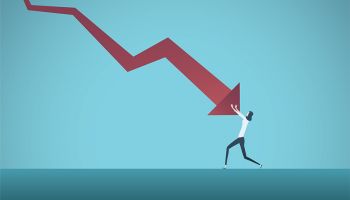Five Reasons Why Negative Interest Rates Would be Bad for Banks and Bad for America
Americans should not be cheering on rates that would turn negative
- |
- Written by Banking Exchange staff

Former Federal Reserve Chairman Alan Greenspan recently said if yields on U.S. bonds turned negative, it would not be “that big a of a deal.” Here are five reasons why not only banks, but Americans should not be cheering on rates that would turn negative like they have in many of the countries in the European Union.
-
The fractional reserve banking system is leveraged to interest rates, which works just fine when rates are on the plus side. When interest rates go negative, banks hold loans that they must pay for out of pocket. Nothing would make less sense than to incentivize banks not to provide credit. Welcome to feudalism, where only those with cash can buy anything.
-
Negative interest rates would also impact savers who are being responsible, as they would have a disincentive to keep money in the bank, thus breaking down the banking system even further.
-
In a negative rate environment, the ability to analyze risk and the economy will be in unchartered territory. While this may not seem like an important variable on its surface, trillions of dollars in trades are dependent on these models, so their absence would create an unstable level of uncertainty.
-
If pension funds put in a negative interest rate in order to assess a pension fund’s funding, every pension fund in America would be underfunded. Pension funds would not be able to come up with models to meet the obligations to their constituents.
-
The REPO market would no longer exist because there would be no incentive to lend securities.
We have some models of what would happen in the United States. One needs to look no further than Europe where some of the largest economies in the European Zone are teetering on recessions, and if one digs deep into the real numbers, some countries are already there.
As reported by Banking Exchange, analysts tracking large United States based banks are being very cautious, but European and Japanese banks are struggling on average even more than their United States counterparts.
As President Trump continues to urge the Federal Reserve to enact lower interest rates to fuel the economy a little more than a year before the presidential election, the economy rests in no short measure on getting the right balance not only for consumer sentiment, but also the health of the American banking system.
Tagged under Financial Research, Feature, Financial Trends, Duties, Risk Management, Risk Adjusted, Rate Risk, Feature3,













